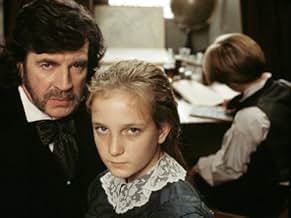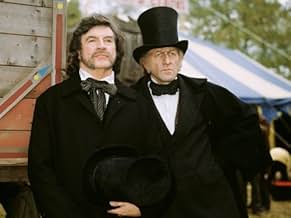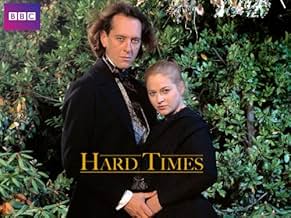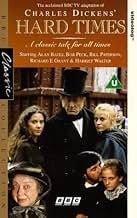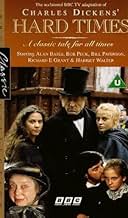Tom y Louisa se presentan por primera vez al público.Tom y Louisa se presentan por primera vez al público.Tom y Louisa se presentan por primera vez al público.
Explorar episodios
Opiniones destacadas
This 1994 adaptation of Hard Times does nobly with adapting Dickens in a relatively short length and to make it accessible to younger audiences. It doesn't quite come off, it does feel 20-30 minutes too short, too many scenes did feel rushed through and skimmed over and Beatie Edney even for someone deliberately cold acts too samey throughout and the constant frowning is overkill. However the costumes and sets are very evocative, not opulent by all means in fact it is a somewhat sparse approach, it succeeds in matching the emphasis on the darker aspects of the book and Dickens without feeling too much. The music has a good deal of atmosphere, while the script is funny, heartfelt and foreboding with some of the Dickenesian spirit present- though some scenes could have had more- and the story while truncated is still compelling and easy to understand. The adaptation is well-directed and also very well-acted. Bob Peck, gruff yet repentant towards the end) was the standout with the (I feel) most interesting and most developed character. Alan Bates acts with realism and professionalism, while Richard E. Grant is dashing and Dilys Laye is a real scene-stealer. In fact all the acting is good, with the only real source of reservation being Edney. Overall, not ideal for "purists" but while far from perfect on its own this adaptation is quite good. 7/10 Bethany Cox
This little known version of Hard Times is a magnificent adaptation of Dickens' novel about the life of a Victorian Family, set in a grim, dark place in the north of England called Coketown. The stellar cast, in particular Alan Bates and Bob Peck, get to the heart of Dickens intentions. There is none of the sanitisation you usually get with Dickens adaptations, this is a full blooded, and sometimes angry, production. The whole point of Dickens writing was to show people the plight of the poor working classes, the underclass, the people forced to live in grinding poverty and suffer starvation, disease and unimaginable squalor. People who had no choice but to work in factories and mills for incredibly long hours, while the mill and factory owners grew rich at their expense. People who died in terrible accidents at work because they were considered expendable and the machines were never allowed to stop. This production captures some of these intended messages perfectly. But in nearly all Dickens' works there are moments of great humour to lighten the darkness and in Hard Times the Slearys of the circus bring a smile or two. This film was originally made for the English syllabus in UK schools by the BBC so it may not be easy to find, but if you like your Dickens raw and honest, you should track it down.
Bob Peck, Alan Bates, Richard E. Grant and Bill Paterson are all actors I admire a great deal. However their best work is elsewhere, and this video is in no way competitive with the 1977 Granada version which is finally out on DVD, and very much worth seeking out.
This 1994 version is truncated to the point of incoherence, sort of like reading Classics Illustrated comic books by flashes of lightning. None of the actors can survive the frenetic pace, with many scenes limited to just two lines of dialog. Characters can't be created in this kind of a rush, just sketched in, with Peck and Grant valiantly approximating real performances, Bates relying on tics and tricks, and Paterson actively bad. But I don't think it's really their fault.
The less-well known but far superior Granada version was adapted by Arthur Hopcraft and directed by John Irvin. Patrick Allen and Timothy West are iconic in their stovepipe hats as Gradgrind and Bounderby, Edward Fox gives a career-defining performance as Harthouse, and Alan Dobie is dry and restrained as Blackpool. Even Rosalie Crutchley as Mrs. Sparsit wins on points over the later version's scene-stealing Dilys Laye.
Skip this one and find the earlier Irvin-Granada version - you won't be disappointed.
This 1994 version is truncated to the point of incoherence, sort of like reading Classics Illustrated comic books by flashes of lightning. None of the actors can survive the frenetic pace, with many scenes limited to just two lines of dialog. Characters can't be created in this kind of a rush, just sketched in, with Peck and Grant valiantly approximating real performances, Bates relying on tics and tricks, and Paterson actively bad. But I don't think it's really their fault.
The less-well known but far superior Granada version was adapted by Arthur Hopcraft and directed by John Irvin. Patrick Allen and Timothy West are iconic in their stovepipe hats as Gradgrind and Bounderby, Edward Fox gives a career-defining performance as Harthouse, and Alan Dobie is dry and restrained as Blackpool. Even Rosalie Crutchley as Mrs. Sparsit wins on points over the later version's scene-stealing Dilys Laye.
Skip this one and find the earlier Irvin-Granada version - you won't be disappointed.
Richard E Grant really made this adaptation. It's a shame I have to write 5 lines on this because there's not a lot to say. Umm. Yes. Some of the glances between the characters were inspired expecially, between Harthouse and Louisa. REG played the dashing cad to a tee. Oh yes. One more line.................!
The book of Hard Times can be very good at times and much of its description is captured on screen. However, I personally find these types of film occasionally dull but if you are keen to see the film-adaptation of the novel then enjoy. The film, in my view, is OK.
¿Sabías que…?
- TriviaLeft-handed Christien Anholt (Tom) is seen writing with his right hand, as Tom is right-handed.
- ConexionesVersion of Hard Times (1915)
Selecciones populares
Inicia sesión para calificar y agrega a la lista de videos para obtener recomendaciones personalizadas
- How many seasons does Hard Times have?Con tecnología de Alexa
Detalles
Contribuir a esta página
Sugiere una edición o agrega el contenido que falta



